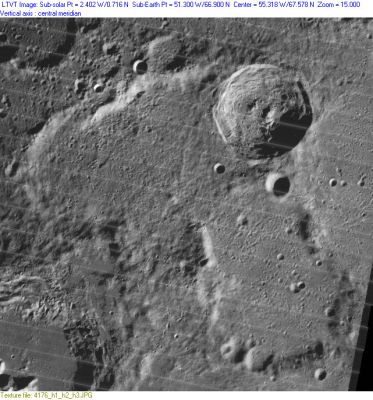Anaximander
Contents
[hide]Anaximander
(IAU outline modified in 1964)
|
Lat: 66.9°N, Long: 51.3°W, Diam: 67 km, Depth: 1.71 km, Rükl: 2, pre-Nectarian? |
LO-IV-176H The prominent 59 km crater near the top of this detail from LO-IV-176H, is not Anaximander, but rather Carpenter. Anaximander itself is the somewhat vaguely defined zone bounded by the two small east and west ridges directly below Carpenter. The 92 km circular enclosure adjoining these ridges on the south is Anaximander D, while a 78 km circle to the far west is Anaximander B. The even larger zone between Anaximander B, Carpenter and Anaximander itself is not named.
Images
LPOD Photo Gallery Lunar Orbiter Images
Maps
(LAC zone 2C4) USGS Digital Atlas PDF
Description
Description: Elger
(IAU Directions) ANAXIMANDER.--A fine but much foreshortened ring-plain, 39 miles in diameter, abutting on the W. side of J.F.W. HERSCHEL. It has a large crater on its E. border, which is common to the two formations, and a very prominent crater, both on the S. and N. The barrier on the S.E. rises to a height of nearly 10,000 feet. Schmidt shows a crater and other details on the floor.
Description: Wikipedia
Additional Information
- Depth data from Kurt Fisher database
- Westfall, 2000: 1.71 km
- Viscardy, 1985: 2.8 km
- Cherrington, 1969: 2.19 km
- Because crater depths normally refer to some kind of measure of the height difference between rim and floor (average or maximum?), the IAU's Anaximander is a particularly ambiguous case. However the heights of the two small rim fragments are well determined by the shadows in the low sun angle view of LO-IV-152M. As measured by LTVT they both appear to be about 2200 m tall at their highest points. - Jim Mosher
- Anaximander A, the 16 km crater between Carpenter and Anaximander has a depth of at least 2,670 m. - Jim Mosher
Nomenclature
- Anaximander (c. 610 BCE–c. 546 BCE) was a pre-Socratic philosopher who lived in Miletus, a city of Ionia. Little of his life and work is known today. According to available historical documents, he is the first philosopher known to have written down his studies, although only one fragment of his work remains.
- The original Anaximander (Collated List / IAU no. 1687) was larger and evidently included at least the area now identified as Anaximander D. The outline of Anaximander was redrawn, and many former satellite features in the area given individual names, by Arthur et al. while preparing the Rectified Lunar Atlas. The changes adopted by the IAU in 1964 are listed in IAU Transactions XIIB. In addition to reducing the size of Anaximander (by creating Anaximander D), the former Anaximander C (IAU no. 1693) was changed to Desargues,
- For a view of the IAU feature names in the pre-Rectified Lunar Atlas days, see Sheet 2 of the Army Map Service's Lunar Topographic Maps.
- Crater Anaximander C was called Arthur by Hugh Percy Wilkins and Patrick Moore (see their book THE MOON), but the I.A.U. did not accept that name. Instead, since 1964 this feature has been known as Desargues. Note: according to IAU Transactions XIIB, point 546 in the control network of Franz was known to him as Anaximander C (distinct from the later IAU feature of that name) and corresponds to the feature known since 1964 as Pascal (which was Carpenter D in the original IAU nomenclature).
- David Arthur: contemporary English amateur astronomer, who later worked in the US as a professional planetary scientist.
- See also Moon-Wiki page D.W.G. Arthur.
LPOD Articles
Bibliography
Anaximander C ("Arthur"): THE MOON by H.P.Wilkins and P.Moore.
